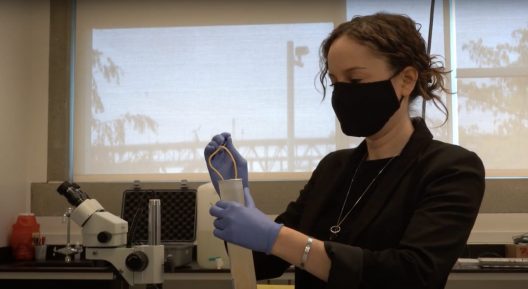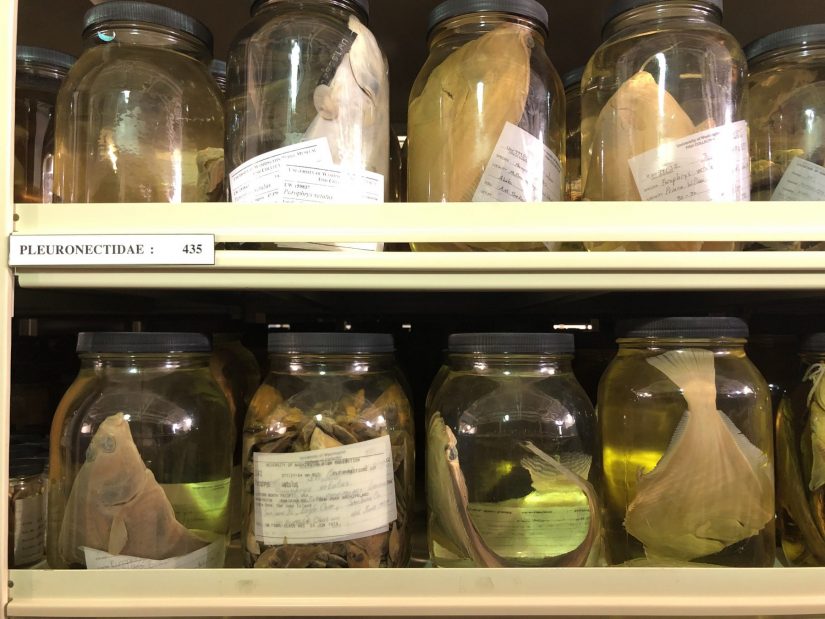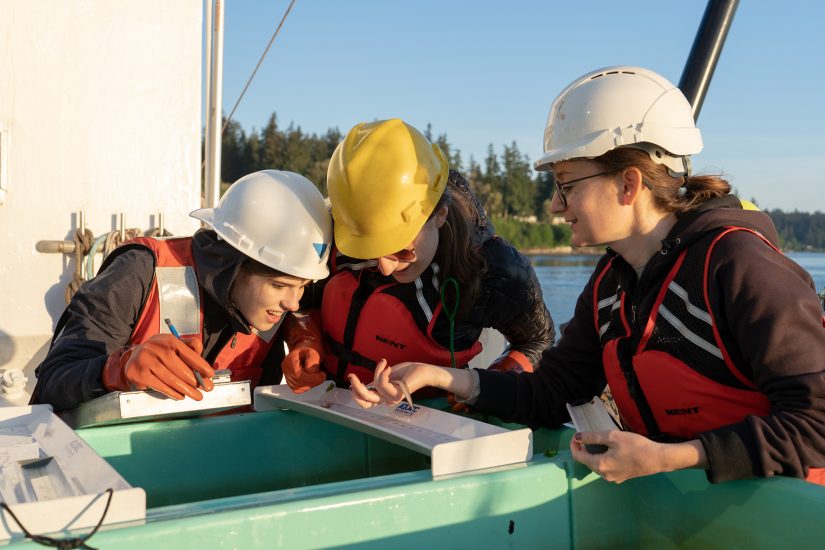Time-traveling parasites: Chelsea Wood wins NSF CAREER Award
SAFS Associate Professor Chelsea Wood is the recipient of a 2022 CAREER Award from the National Science Foundation (NSF). This prestigious award will support Wood’s novel research on the historical ecology of parasitism and will allow her to create an active-learning, open-access version of her undergraduate parasite ecology course.
 The NSF selects award recipients who are faculty members at the beginning of their careers with the potential to serve as academic role models in research and education and to lead advances in the mission of their department or organization. The intent of the NSF CAREER program is to provide stable support that enables awardees to develop their careers not only as outstanding researchers, but also as educators demonstrating commitment to teaching, learning, and dissemination of knowledge.
The NSF selects award recipients who are faculty members at the beginning of their careers with the potential to serve as academic role models in research and education and to lead advances in the mission of their department or organization. The intent of the NSF CAREER program is to provide stable support that enables awardees to develop their careers not only as outstanding researchers, but also as educators demonstrating commitment to teaching, learning, and dissemination of knowledge.
“This is my dream project,” said Wood. “NSF’s support will let my team travel back in time to answer the question: is the world wormier than it used to be?”
Global environmental change is thought to increase the transmission of parasites that cause infections; however, there are vanishingly few historical data that track rates of wildlife disease over time. Without a long-term dataset, it is challenging to determine if the burden of infection observed today is “normal.”
“I’ve worked extensively in pristine places, like uninhabited islands in the central Pacific. Untouched ecosystems that exist today give us some hints about how all ecosystems used to work, before human influence changed them. In fact, we often call today’s pristine ecosystems ‘windows into the past.’ But if they are windows into the past, the panes are a little grimy, because no modern ecosystem is totally untouched by human influence,” said Wood. “Our approach is to extract parasitological information from museum specimens of fish from the past several decades, giving us the opportunity to actually reconstruct parasite assemblages as they were 20, 50, or even 100 years ago.”
Wood has put together a powerful experimental design using fish collections to look at the parasite burden before and after a change in the environment. New techniques have allowed researchers to successfully dissect preserved specimens and examine them for whatever parasites they hosted when they were collected.
In addition to her work at the University of Washington Burke Museum’s Fish Collection, Wood will examine fishes at the Tulane University Biodiversity Research Institute and the University of New Mexico’s (UNM) Museum of Southwestern Biology—chosen for specimens they house in relation to anthropogenic changes that have occurred in the environments in which they originated. The Tulane collection contains fishes sampled over 42 years up- and down-stream of discharge from two pulp mills. UNM has amassed the largest collection of fishes (including some endangered species) from any urban ecosystem in North America, with over 70 years of specimens collected above and below a diversion channel in the Rio Grande River.
This NSF grant will help fund a new PhD student and a postdoctoral scholar in Wood’s lab along with eight undergraduate students, four from the UW and four from other institutions.
The prevalence or lack of parasites within the specimens can answer vexing environmental questions that have thus far eluded researchers. This opportunity will allow Wood to peer back in time and gain an understanding of ecosystems of the past: how abundance of parasites has changed over decades, the role of environmental stressors such as pollution and urbanization in that change, and whether these stressors also influence the stability of parasite communities as they experience other disturbances.
The CAREER award will also provide support for Wood to re-design her Parasite Ecology course (FISH 406), infusing active-learning principles, adding a new module on her CAREER-funded research, and implementing a course-based undergraduate research experience (CURE). For their CURE projects, each enrolled student will pose their own ecological question, analyze real datasets produced by Wood’s team, and write a journal-style article on their findings.“The goal is to let students step into the role of scientists; they get an authentic research experience, and the students, in turn, will make discoveries in our datasets that the research team might otherwise miss,” said Wood. “Students with outstanding papers will be supported to revise and submit their work to peer-reviewed journals.”
Wood plans to measure the impact on student learning of the redesigned course compared with a more traditional teaching style. She plans to publish the results, so that her findings can be adapted by other instructors.
For younger students, Wood is developing a 2nd–5th grade module on parasites, which can be used by elementary school teachers along with an accompanying children’s book on parasites, which she is authoring.

Finally, Wood is making sure that all the products of her CAREER award are publicly accessible. “Our data will be posted to public repositories, the re-designed course will be fully downloadable for other institutions to use, and our elementary learning module will be an open educational resource.” In addition to producing new discoveries about how parasite transmission has changed through time and in response to anthropogenic stressors, she hopes that this project will make it easy for teachers and professors at other institutions to offer material on parasites to their students. “They’re at least 40% of all animal species,” Wood said. “It’s about time for us to understand whether parasites are increasing or declining through time, and beyond time, for parasitism to be part of biology education.”

